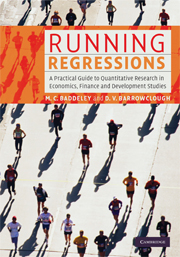 Running Regressions
Running Regressions Book contents
- Frontmatter
- Contents
- List of figures
- List of tables
- List of boxes
- Acknowledgements
- List of acronyms
- How to use this book
- Part I Simple regression and data analysis
- Part II Multiple regression and diagnostic testing
- 5 Multiple regression analysis
- 6 Heteroscedasticity
- 7 Autocorrelation
- 8 Model misspecification
- Part III Time-series econometrics
- Part IV Advanced topics
- Index
- References
5 - Multiple regression analysis
Housing demand in the UK
Published online by Cambridge University Press: 05 June 2014
- Frontmatter
- Contents
- List of figures
- List of tables
- List of boxes
- Acknowledgements
- List of acronyms
- How to use this book
- Part I Simple regression and data analysis
- Part II Multiple regression and diagnostic testing
- 5 Multiple regression analysis
- 6 Heteroscedasticity
- 7 Autocorrelation
- 8 Model misspecification
- Part III Time-series econometrics
- Part IV Advanced topics
- Index
- References
Summary
Economic issues include:
Durable consumption goods
Credit constraints and gearing
Econometric issues include:
OLS using EViews
Multiple regression analysis (MRA)
F tests of restrictions
Data issues include:
Hedonic pricing
Capturing seasonality using dummy variables
Dummy variable trap
The issue
Developments in housing markets have wide-ranging implications for the macro-economy. Increases in house prices will boost household wealth, thereby boosting consumption and fostering increases in aggregate demand. Increases in house prices may also affect consumer confidence and expectations, increasing general optimism within the economy. On the other hand, rigidities in housing markets have crucial implications for labour mobility, employment and unemployment. For example, housing market volatility will limit the ability of people to move in search of better jobs: Oswald (1997) observed that countries with fastest growth in home ownership in the 1980s and 1990s had the fastest growth in unemployment and attributed this to the labour immobility of owner occupiers in depressed housing markets, particularly those home owners who face negative equity (a situation which occurs when mortgage borrowings on a property exceed the value of the mortgaged property).
The affordability of housing will also affect householders' decisions to invest in housing: as house prices rise and incomes fall, people will choose other alternatives (e.g. renting, living with family) and cannot afford to enter the housing market either because their incomes are too low and/or because they cannot get easy access to mortgage credit.
- Type
- Chapter
- Information
- Running RegressionsA Practical Guide to Quantitative Research in Economics, Finance and Development Studies, pp. 109 - 132Publisher: Cambridge University PressPrint publication year: 2009


